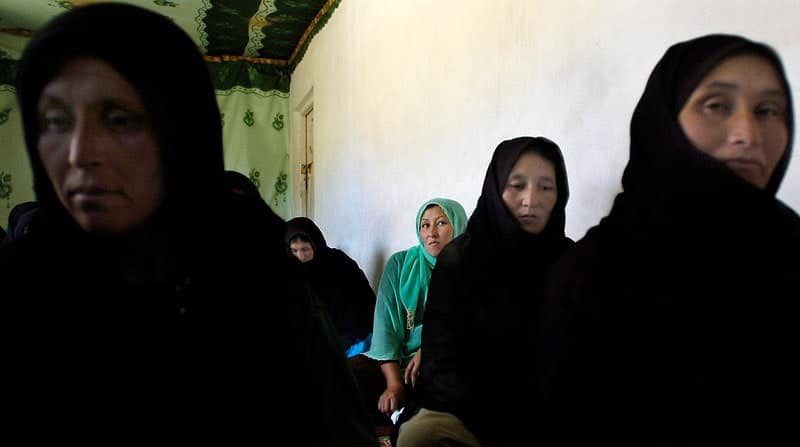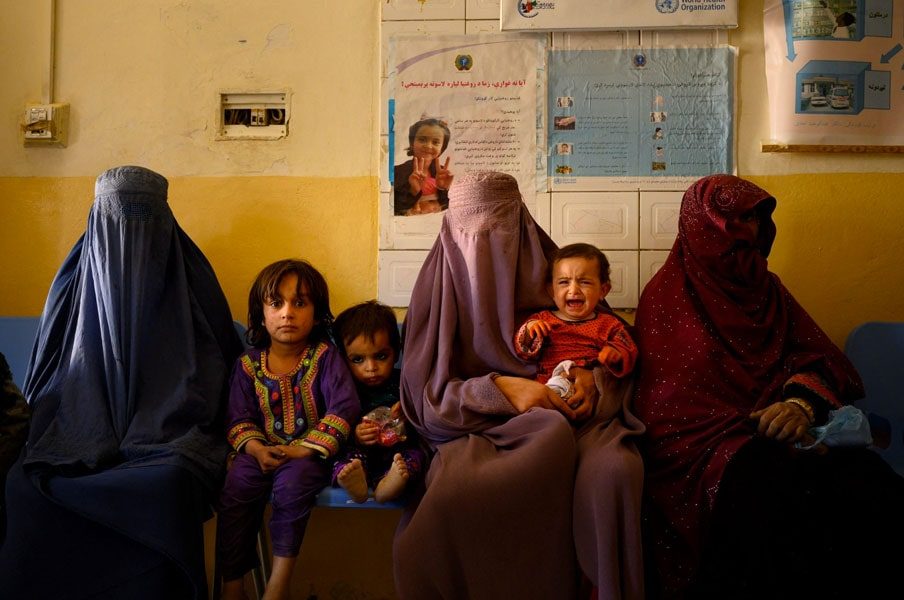Cover photo by ELISE BLANCHARD/AFP via Getty Images
Since last week’s events in Afghanistan, all eyes are on the Afghan population, whose lives changed overnight. The Taliban seizure of power from the Afghan government has captured headlines and hearts, with the international community watching in helpless despair as Afghans confront their now endangered reality for the foreseeable future.
A radical religious and militant movement, the Taliban first took hold of Afghanistan in the nineties, losing power after the first U.S. invasion. The Taliban’s return to power, after nearly 20 years, has already changed the life course of every single Afghan. While thousands of Afghans have attempted or succeeded in escaping Afghanistan since last week, millions remain behind to face a terror they are all too familiar with. Of particular concern is the wellbeing and survival of Afghan women. A generally vulnerable group worldwide, Afghan women specifically endured a lethal degree of depravity and human rights violations under Taliban rule. With the Taliban’s resurgence, Afghan women are arguably the most endangered group in the world.
From the inception of Taliban rule in 1996, Afghan women were subjected to gender apartheid. Lives drastically changed overnight, as women were banished from the workplace, from schools, and from public life. Afghan women essentially lived under house arrest under Taliban rule, unable to leave the house unless with a male guardian and forced to cover their bodies according to Taliban dress codes. If even able to leave their home, women were only to be seen, never heard.
There are consequences for daring to simply exist as a woman under the Taliban. Any violation of any Taliban rule was met with extreme violence, regardless of if a violation occurred at all. Afghan women endured brutal rapes, public executions, vicious beatings and more for simply living their daily lives, wearing nail polish, trying to go to the doctor, or not wearing burqas.
Millions of Afghan women compose a generation in ongoing recovery from the traumas of the previous Taliban regime. Alongside a new generation of Afghan females unfamiliar with Taliban governance, the last 20 years for Afghan women were defined by their freedom; freedom to leave the house by themselves, wear what they want, study what they choose, and work where they please. Today, these same women mourn their stolen freedoms and the lives they lived, not even a week ago.
“I cannot stop my tears… I keep crying” says Aina, after last week’s event’s in Kabul. Having endured her youngest years of life under the first Taliban regime, their eventual collapse allowed her to achieve a university education, pursue a part-time job, and live by herself. She’s not sure how she will survive, as she and many other Afghan women are reliving the darkest years of their lives. Aina is aware of what is now at stake. “I cry for everybody, for all Afghan women… For the freedom we had before.”

Afghan Women Learning English through UNICEF Program, 2009. Photo by UN Photo/Eric Kanalstein
Afghan women know what’s to come; so many have suffered it before. They are painfully conscious of how endangered their existence now is. Some say they would simply rather die. It speaks volumes of the extent of the Taliban’s depravity, that women fear them more than they fear death.
Maryam Durani managed to escape Kabul before the arrival of the Taliban. “There’s no guarantee for our security” she says, proven by the now emptied streets of Kabul. Once a bustling capital, the city is noticeably void of women. One week ago, they could have reliably made it home safely. Now, it’s not worth the risk to even leave the house.
After the first fall of the Taliban, Afghan women returned to work and schools in masses, eager to resume their educations and integrate their knowledge into rebuilding the country. Now, two decades of evolution and progress are gravely threatened. “This morning when I reached home, the very first thing my sisters and I did was hide our IDs, diplomas and certificates. It was devastating.” Laments an anonymous Afghan student who was told by a Taliban member that it was her last day out on the streets. The future of female education in Afghanistan is bleak, leaving young schoolgirls in devastating uncertainty; “A week ago, we were planning on how to study and work in the fall semester of university, but now everyone is scared to death. Our dreams are gone!”
Most devastating are the stories of Afghan mothers who lost their childhood to Taliban rule and are now raising the next generation of Afghan women. Now, they will relive their traumas and watch their own children endure the same. Last week, Dr. Zuhal was brutalized, dragged from her taxi and whipped for filming Kabul’s destruction. However, her physical pain appears incomparable to the pain she feels for her daughter’s future. “I have so many dreams for her,” she said, “My life and my achievements are tearing in two pieces in front of my eyes. I never want this to happen to my daughter.”
Ainy, another mother to young Afghan daughters, can no longer work and isn’t sure how she will feed her kids. “I don’t know what will happen to me, to my job, my life. I think about my daughters, the future of my daughters.”
Last week marked the inception of a perpetual mourning period for female lives and prosperity in Afghanistan. They mourn the past and will forever mourn their stolen futures. Afghan women don’t know when life will return to normal, if ever. They only know the certain uncertainty they will be forced to face for now.
Like what we have to say? Sign up to subscribe to email alerts and you’ll never miss a post.










